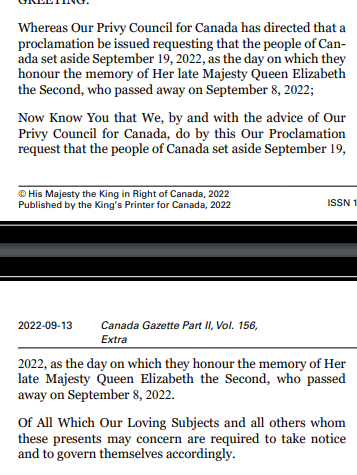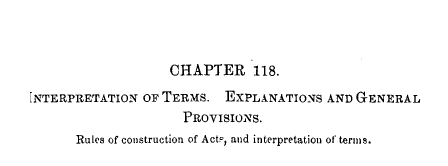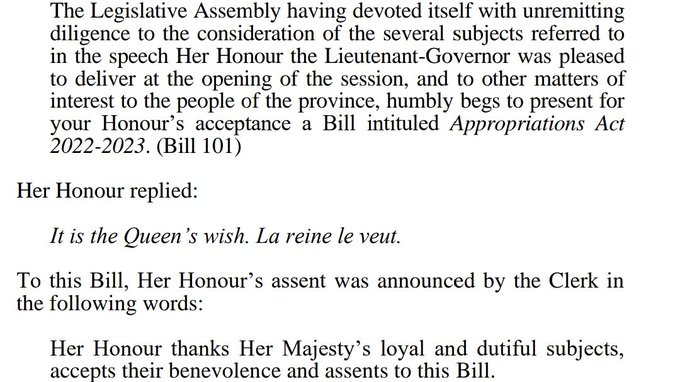Is September 19 a Public Holiday
in New Brunswick?
On September 13, 2022 the Prime Minister of Canada announced that September 19 will be a public holiday to mourn the passing of her late majesty Queen Elizabeth II.
"We have ... chosen to move forward with a federal holiday on Monday [Sept. 19]," Trudeau said in New Brunswick, where he is attending a Liberal caucus retreat.
"We will be working with the provinces and the territories to try and see that we're aligned on this. There are still a few details to be worked out, but declaring an opportunity for Canadians to mourn on Monday is going to be important."
The federal Interpretation Act states that a holiday includes "any day appointed by proclamation to be observed as a day of general prayer or mourning or day of public rejoicing or thanksgiving;"
Similarly the Bills of Exchange Act for the purposes of bill payments states that under subsection 42(a)(iii):
(iii) any day appointed by proclamation to be observed as a public holiday, or as a day of general prayer or mourning or day of public rejoicing or thanksgiving, throughout Canada, and
Of note is the Canada Labour Code does not list a day by proclamation by the Governor General as a paid holiday.
This proclamation is of interest as it represents a marked departure from prior proclamations declaring the death of the Monarch as a day of general mourning.
For example, after the passing of George VI, the federal proclamation the Administrator of the Government of Canada uses the operative language of "appoint and set apart Friday the fifteenth instant as a Public Holiday to be observed as a Day of General Mourning by all persons throughout Canada."
The deaths of Queen Victoria in 1901, Edward VII and George V use similar language of a "Public Holiday".
There is a question as to whether the proclamation is sufficient to trigger a Day of General mourning. The Prime Minister did declare a public holiday but there is a distinction between a statutory holiday and a holiday by proclamation? If in fact despite using a different form and language, in law this proclamation triggers a public holiday then it will have an impact on many provinces where many provincial Legislatures automatically recognize a day of general mourning
New Brunswick Holidays
New Brunswick's Interpretation Act declares that a holiday includes a "Proclamation of the Governor-General or of the Lieutenant-Governor as a general holiday within the Province". This means that either the Governor General acting on the advice of the federal cabinet or the Lieutenant Governor acting on the advice of their provincial cabinet can declare a day to be a holiday.
By this logic any proclamation by the Governor General declaring a holiday in New Brunswick will automatically become a provincial holiday without any involvement from the Provincial Cabinet. This is specifically because the New Brunswick Legislature has chosen to do so. To repeat even if the Governor General has not declared a general day of mourning, the provincial government has the legal authority to do so if it wishes. In past occurrence, the provincial cabinet may have issued a proclamation as in 1910 (above) but this did not displace the federal proclamation of a holiday.
This definition of a holiday has implications for example on when provincial courts are open. Of importance for most New Brunswickers is that under the
Days of Rest Act, a day proclaimed by the Governor General or the Lieutenant Governor is automatically a prescribed day of rest.
"(k) any day appointed by any Statute in force in the Province or by Proclamation of the Governor General or Lieutenant-Governor as a general holiday within the Province;"
This means that with certain significant exceptions, no person shall conduct retail business or admit members of the public on a prescribed day of rest.
4(2)Subject to subsections (3) and (4), no person shall, on a prescribed day of rest,
(a) carry on retail business, or
(b) admit the public to any premises where a retail business is carried on.
Individuals who violate this section commit a category C provincial offence where they are liable to a fine of not less than $140 and not more than $1,100.
However a proclaimed holiday by the Governor General or the Lieutenant Governor does not result in an automatic
paid public holiday under the
Employment Standards Act. In this manner a holiday in relation to mourning the passing of the Queen is similar to Thanksgiving or Boxing Day in New Brunswick.
Discussion
Other New Brunswick and other provinces through their press releases seem to imply that it is in fact a National Day of Mourning and a Public Holiday:
British Columbia: Our government will follow the lead of the federal government and join with other provinces in observing the national day of mourning to mark the Queen’s funeral.
“The national holiday will be observed Monday, Sept. 19 by federal employees. We have advised provincial public-sector employers to honour this day in recognition of the obligations around federal holidays in the vast majority of provincial collective agreements.
In New Brunswick, the provincial press release also seems to interpret September 19 as a National Day of Mourning by federal proclamation:
FREDERICTON (GNB) – Government offices and schools in New Brunswick will be closed on Monday, Sept. 19, as part of the National Day of Mourning for the passing of the Queen.
This one-time provincial and national holiday is intended to honour the Queen and pay respect to her life of service to Canada and to the Commonwealth of Nations on the day of her funeral.
The day will be treated as any other holiday for management and non-union employees in Parts I, II and III of the provincial public service. This includes central government departments and agencies, as well as the anglophone and francophone public school systems. Collective agreement terms and conditions for holidays will apply to unionized employees in Parts I, II and III. While government offices and public schools will be closed, this holiday will be optional for private sector businesses and employers.
The issue with this press release is that under the Days of Rest Act, the holiday isn't optional for the private sector, it would be a prescribed day of rest. It would require a legislative amendment for the Government to not declare September 19th a prescribed day of rest. Further, it would also require a legislative amendment to make September 19th a paid holiday under the Employment Standards Act
So is September 19th a provincial holiday that is binding on the private sector in New Brunswick? It would appear so although this may be accidental but the press release by government does refer to a National Day of Mourning. The wording of the federal proclamation does cause significant confusion. The federal government absent a legislative amendment does not have the authority to declare September 19th a (paid) public holiday for federally regulated workers in the private sector per the Canada Labour Code. However, New Brunswick has chosen itself to automatically cause a federal proclamation of a holiday to be provincial holiday without any involvement of the provincial cabinet.
Granted this situation appears to be inadvertent so employees looking to rely upon September 19 as a provincial holiday would be well advised to check with their employer first. The requirement for holidays represent the minimum that is legally required. An individual's particular employer may chose to offer a paid holiday on September 19 if they choose to do so or a unionized employee's collective agreement may have a specific criteria for proclaimed holidays.

























